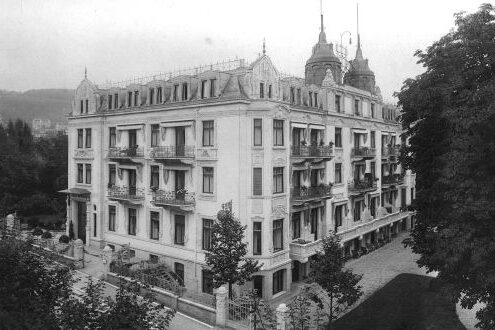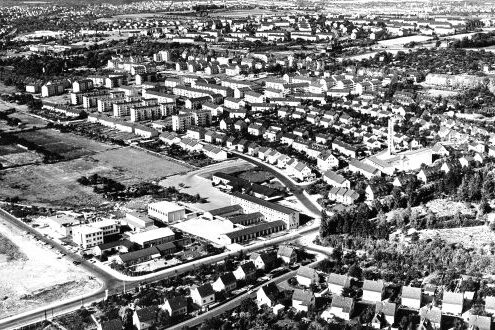GeWeGe
After the end of the Second World War, GeWeGe was primarily involved in the reconstruction of the city's destroyed historical buildings. Later, it was also involved in the renovation of the Bergkirchen district and was responsible for the conversion of the Palasthotel. Today, it manages numerous - mostly historical - properties in Wiesbaden.
Wiesbaden has always been a growing city: around 1900, 86,000 people lived in the spa town, 40 years later it was already home to over 190,000. The city succeeded in alleviating the housing shortage with its own construction measures. However, it needed professional support with administration and management, partly because it was unable to cope with the late rent payments. This was the birth of the "Gesellschaft zur Verwaltung städtischer Mietshäuser mbH". The articles of association were signed in 1932. The company had a central task: to collect the "unpaid rents" for the city.
With a view to a more suitable instrument of municipal housing policy, the establishment of a non-profit housing association was recommended. However, as the "Gesellschaft zur Verwaltung städtischer Mietshäuser mbH" already existed, it was decided to change its name. The company was now called "Gemeinnützige Wohnungsgesellschaft der Stadt Wiesbaden mbH", or GeWeGe for short.
Although Wiesbaden was largely spared extensive destruction during the Second World War, over 28,000 people were still homeless at the end of the war. GeWeGe therefore took on the task of initially rebuilding the city's destroyed, historic building stock, thereby making a significant contribution to the preservation of the historic building fabric, which is still a key feature of Wiesbaden's cityscape today.
At the end of the 1950s, GeWeGe also began to realize new construction projects. By 1974, it was already managing more than 450 residential buildings with over 2,800 apartments. The company continued to expand rapidly in the following years. Apart from its involvement in the extensive refurbishment of the Bergkirchen district, it was responsible for the construction of several major projects. Several apartment buildings and the first 120 age-appropriate apartments were built.
The company's non-profit status was revoked at the end of 1989. In 1992, GeWeGe took on the role of owner for the first time with the acquisition of the municipal housing stock. With its ongoing refurbishment and new construction measures, GeWeGe is helping to significantly shape the cityscape, even in prominent locations. To date, the conversion of the Palast Hotel on Kranzplatz is one of the best-known projects.
At the end of 2006, GeWeGe managed a real estate portfolio of almost 4,300 apartments, around 260 commercial units and around 1,500 garages and parking spaces in the city. Adapting the predominantly historical buildings to modern energy standards is a major challenge.
The continuation of refurbishment activities also benefits the environment. In addition, the implementation of the investment program will adapt the historic architectural and floor plan concepts to contemporary living requirements and thus create the conditions for sustainable rentability of the apartments. In order to remain competitive, additional measures are required, which are to be implemented together with the sister company GWW: GeWeGe is also relocating its headquarters from Nerotal to GWW in Hessenhaus for this reason.

